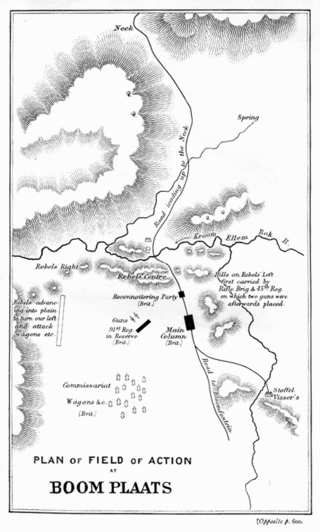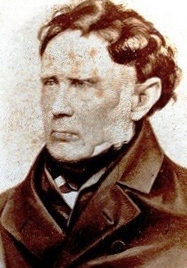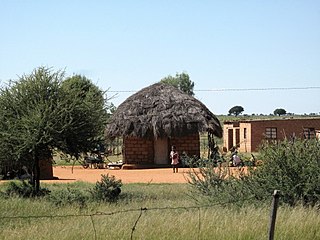| |||||||||
| Decades: | |||||||||
|---|---|---|---|---|---|---|---|---|---|
| See also: | |||||||||
The following lists events that happened during 1853 in South Africa .
| |||||||||
| Decades: | |||||||||
|---|---|---|---|---|---|---|---|---|---|
| See also: | |||||||||
The following lists events that happened during 1853 in South Africa .

The Orange Free State was an independent Boer-ruled sovereign republic under British suzerainty in Southern Africa during the second half of the 19th century, which ceased to exist after it was defeated and surrendered to the British Empire at the end of the Second Boer War in 1902. It is one of the three historical precursors to the present-day Free State province.

The Boer republics were independent, self-governing republics formed by Dutch-speaking inhabitants of the Cape Colony and their descendants. The founders – variously named Trekboers, Boers, and Voortrekkers – settled mainly in the middle, northern, north-eastern and eastern parts of present-day South Africa. Two of the Boer republics achieved international recognition and complete independence: the South African Republic and the Orange Free State. The republics did not provide for the separation of church and state, initially allowing only the Dutch Reformed Church, and later also other Protestant churches in the Calvinist tradition. The republics came to an end after the Second Boer War of 1899–1902, which resulted in British annexation and later incorporation of their lands into the Union of South Africa.

The Griquas are a subgroup of mixed-race heterogeneous formerly Xiri-speaking nations in South Africa with a unique origin in the early history of the Dutch Cape Colony. Like the Boers they migrated inland from the Cape and in the 19th century established several states in what is now South Africa and Namibia. The Griqua consider themselves as being South Africa’s first multiracial nation with people descended directly from Dutch settlers in the Cape, and local peoples.

Griqualand West is an area of central South Africa with an area of 40,000 km2 that now forms part of the Northern Cape Province. It was inhabited by the Griqua people – a semi-nomadic, Afrikaans-speaking nation of mixed-race origin, who established several states outside the expanding frontier of the Cape Colony. It was also ancestral home to the Tswana and Khoisan peoples.

Winburg - Makeleketla is a small mixed farming town in the Free State province of South Africa.
Jacobsdal is a small farming town in the Free State province of South Africa with various crops under irrigation, such as grapes, potatoes, lucerne, and groundnuts. The town was laid out in 1859 by Christoffel Jacobs on his farm Kalkfontein, and its last recorded population was 3,504.

Ohrigstad, formerly Andries Ohrig Stad, is a small town to the north of Lydenburg in the Limpopo province, South Africa.

Campbell is a small town situated on the edge of the Ghaap Plateau in the Northern Cape province of South Africa. It is located 48 km east of Griquatown on the N8 road. It was originally known as Knovel Valley and then Groote Fontein, but was renamed in honour of the Reverend John Campbell who visited the Cape Colony in 1813.
The following lists events that happened during 1820 in South Africa.
The following lists events that happened during the 1780s in South Africa.

Griekwastad is a country town in South Africa. It is sometimes still called Griquatown, a name which is now considered historical. The town is on the N8 road in the Northern Cape Province of South Africa 168 kilometres (104 mi) by road west from the city of Kimberley. It was the first town to be established in the country north of the Orange River.
The following lists events that happened during 1896 in South Africa.

The Battle of Boomplaats was fought near Jagersfontein at 29°50′53.47″S25°38′56.54″E on 29 August 1848 between the British and the Voortrekkers. The British were led by Sir Harry Smith, while the Boers were led by Andries Pretorius. The British were victorious after one Boer opened fire too early and betrayed their position.
Andries Waterboer was a leader ("kaptijn") of the Griqua people.

Sir Andries Stockenström, 1st Baronet, was lieutenant governor of the Eastern Province of the Cape Colony from 13 September 1836 to 9 August 1838.

Dithakong is a place east of Kuruman in the Northern Cape, South Africa, which had been a major destination for several of the earliest nineteenth century expeditions from the Cape to the interior of the subcontinent. In colonial literature, its name is often rendered in such ways as Litakun, also Litakoo or Lattakoo.

Justice Andries Stockenström, second son of Sir Andries Stockenström, was an influential judge in the Cape Colony. He was appointed Attorney-General of the Cape in 1877, but died soon after his appointment at the age of 36.

In the colonial history of South Africa, the Griqualand West Annexation Act, was the act, passed in the Cape Colony Parliament on 27 July 1877, authorising the union of the Cape Colony with Griqualand West.

Nic(h)olaas Waterboer was a leader ("Kaptijn") of the Griqua people.
Corneli(u)s Kok II was a leader ("captain") of the Griqua people in southern Africa.
See Years in South Africa for list of References